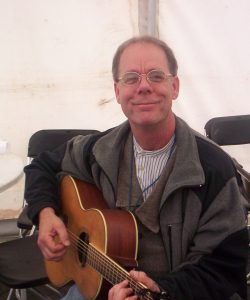
About John Egenes:
I have made my living as a musician for most of my life, and I spent a lot of years as a saddlemaker, as well. I've been a dog catcher, a cab driver, a computer programmer, and a hobo, among other things. Whatever it takes to get by. I usually learn by making mistakes. I keep thinking I've made 'em all, but I always seem to find one more to trip over. As I stumble along, I tend to view my life through a windshield full of squashed bugs.
I've always been an obsessive reader, so much so that friends often give me a hard time about it when they see me in a café with my nose stuck in a book. I've been a songwriter for most of my life and I must say, I never saw myself as an author of a book. Needless to say, "Man & Horse" only took me 40 years to write. And now, I reckon the writer's bug has bitten me.
I grew up in Southern California, spent most of my life in Northern New Mexico, and these days I make my home in New Zealand, where I suffer from constant withdrawls for lack of New Mexico green chile.
What inspires you to write?
The book is a memoir of my ride across America in 1974 with my horse, Gizmo. So, I guess I waited long enough [grin]. I actually wrote a manuscript shortly after the ride, but it wasn't any good and I knew it at the time. I was still too close to it all. I threw that manuscript down in a box and it's been there ever since. I'm glad I waited. It allowed me to be able to view the ride from hindsight, to spend a good many years contemplating it all, and to compare yesterday with today.
Tell us about your writing process.
Well, I’m probably first and foremost a songwriter, so I look at writing with an eye for a few things: tight editing, staying focused, and allowing the reader (or listener) to place themself in the story or song, to imagine that it’s about them. And of course, I want it to be entertaining.
That said, I'm a sort of seat-of-the-pants kinda guy. I just spew things out in print, then sift through them to find any good nuggets that might be there.
Not sure if I have a specific process, but I do know that more more you write, the better you get. Even if you write garbage, eventually it will get better. I'm living proof of that [grin].
For Fiction Writers: Do you listen (or talk to) to your characters?
Yep, all the time. I talk to myself when I'm driving, when I'm walking down the street, when I'm sitting at my computer. And I don't think it's odd at all. In fact, I'm pretty sure that talking to yourself is completely normal, and it's good for you. Because if you get into an argument with yourself, you always win!
What advice would you give other writers?
Read. Spend a lot of time reading. Read every kind of writer there is… not just those who write the same genre as you do. If you write sci fi, make sure to read philosophy and westerns and love stories. If you're into non-fiction, read some fantasy or sci fi books. You get the idea. Spread yourself around and take in as much good (and bad) writing as you possibly can. Reading good writers helps you to identify good writing when you read it, helps you to know what good writing is.
How did you decide how to publish your books?
The industry decided that for me. I'm a musician, and book publishing seems to be a lot like performing. It's harder to get a good agent than it is to get a gig. So, after stumbling around, trying to interest an agent, I just published it myself through online means. It has worked out stupendously well for me, I must say. And no, it's not for everyone. You have to do your homework and make your decisions based upon cold, hard facts. Sometimes that's not very fun.
What do you think about the future of book publishing?
On-demand printing has changed the game, and it will change further when localized book printing gets here. For instance, I'm in New Zealand. So, I can buy a book on Amazon or Barnes & Noble for, say fifteen bucks. But it costs another twenty to ship it over here. They will print on demand, which means they don't print a large run–they will print a single book if need be–and so there's no need to store piles of books in warehouses. When on-demand printing arrives all over the world, I'll be able to have to book printed locally. Eventually, I'll be able to download it and print it on my own printer.
There is still a need for large publishing houses, but they're going through the same thing as music and film–disruptive technology. They can no longer base their business upon a 20th century model. The world now lives in a digital ecosystem, and everything has to adapt.
What do you use?: Professional Editor, Beta Readers
What genres do you write?: Memoir, and now I'm writing an historical adventure novel.
What formats are your books in?: Both eBook and Print
Website(s)
John Egenes Home Page Link
Link To John Egenes Page On Amazon
Link to Author Page on other site
Your Social Media Links
Goodreads
Facebook
Twitter
All information in this post is presented “as is” supplied by the author. We don’t edit to allow you the reader to hear the author in their own voice.
